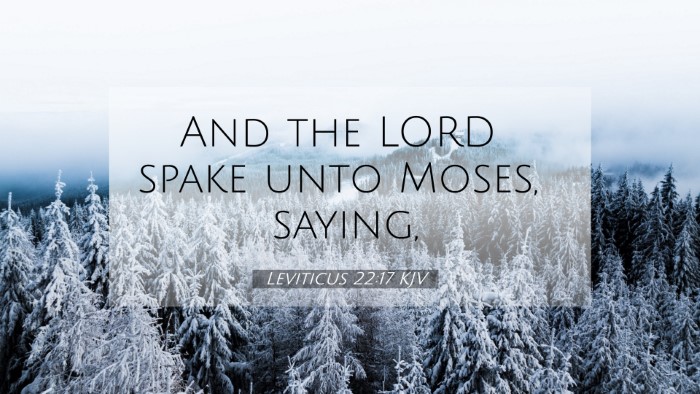Understanding Leviticus 22:17
Leviticus 22:17 states:
"And the Lord spoke to Moses, saying,
This verse serves as an introduction to a broader set of laws concerning sacrifices and offerings, emphasizing the importance of obedience and the sanctity required in worship.
Summary of Key Themes
- The Authority of God’s Instructions: The phrase “the Lord spoke to Moses” demonstrates the divine origin of the commandments, indicating that these regulations should be taken seriously by the Israelites.
- Importance of Offerings: This verse prefaces God’s instructions on how the Israelites should bring their offerings, emphasizing that offerings must be made in a way that is pleasing and acceptable to God.
- Call to Holiness: It underscores a prevailing theme in Leviticus—the call to holiness and purity among God’s people, as they must present offerings that reflect their reverence towards God.
Commentary Insights
Matthew Henry's Commentary
Matthew Henry emphasizes that this verse shows the necessity of divine communication in the establishment of worship practices among the Israelites. He notes that God is specific about the requirements for sacrifices to highlight His holiness and the need for His people to approach Him correctly.
Albert Barnes' Notes
Albert Barnes addresses the context of sacrificial laws, pointing out that God's instructions were vital for maintaining the covenant relationship between Him and the Israelites. He explains that the offerings reflect the character of the offerer, and thus, should be done with intention and care.
Adam Clarke's Commentary
Adam Clarke elaborates on the responsibilities of the priests in dealing with offerings. He asserts that these regulations were not only for worship but also formed a moral code guiding the Israelites in their relationship with God and each other.
Related Bible Cross-References
- Exodus 12:5 - Instructions on the unblemished lamb for the Passover.
- Leviticus 1:3 - Consistent guidelines for acceptable offerings.
- Leviticus 10:10-11 - Importance of distinguishing between holy and common things.
- Numbers 18:22 - Responsibilities of the priests in receiving offerings.
- Deuteronomy 15:21 - Principles concerning perfect lambs for sacrifice.
- Psalm 51:16-17 - God's desire for a contrite heart over mere sacrifices.
- Isaiah 1:11 - The futility of offerings without righteousness.
Inter-Biblical Dialogue and Parallel Concepts
The themes presented in Leviticus 22:17 resonate throughout both the Old and New Testaments. In understanding this verse, we see its connections to the overarching Biblical narrative of sacrifice and redemption. The following sections explore thematic connections that deepen our understanding:
- Hebrews 9:14: Discusses Christ as the perfect sacrifice.
- Romans 12:1: Paul urges believers to present themselves as living sacrifices.
- Matthew 5:23-24: Importance of reconciliation before bringing offerings to God.
Exploring Themes Through Cross-Referencing
Understanding Leviticus 22:17 requires an exploration of the sacrificial system established in the Old Testament and its fulfillment through Christ. Here are methods for cross-referencing Biblical texts:
- Comprehensive Bible Concordance: Use to locate themes and connections related to holiness and offerings.
- Bible Reference Resources: Tools like commentaries that discuss the interplay between the Law and grace.
- Bible Cross-Reference Guides: Identifying passages that illuminate the meaning and purpose of sacrifices.
Conclusion
Leviticus 22:17 not only directs individuals on the importance of offerings but also illuminates how we can understand God’s requirements in the light of Christ’s ultimate sacrifice. Through the guidance of historical and theological commentaries, believers can grasp the significance of these instructions, emphasizing the importance of purity, intention, and reverence in worship.


